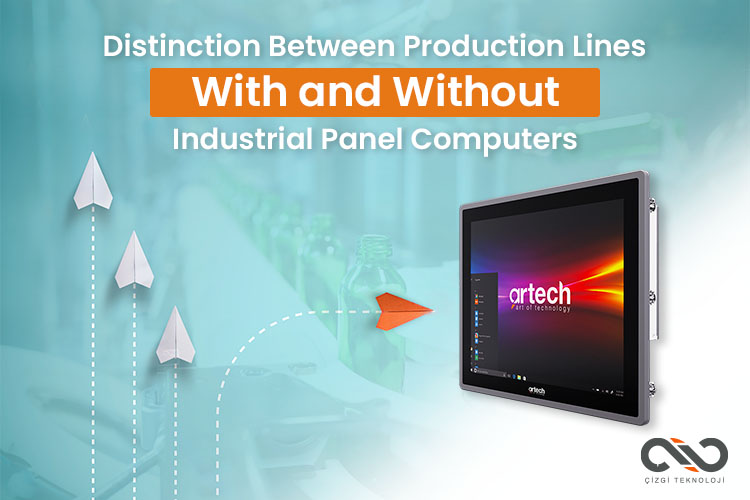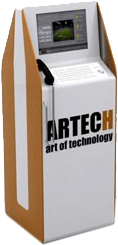Distinction Between Production Lines With and Without Industrial Panel Computers

There are several differences between production lines with and without industrial panel computers.
Here are some of the main ones:
Real-time monitoring: Production lines with industrial panel computers can be monitored in real-time, providing operators with up-to-the-minute information on the status of the production line. This allows operators to quickly identify any issues, such as machine malfunctions or bottlenecks, and take action to resolve them. Without industrial panel computers, monitoring may be done manually, which can be slower and less efficient. For example, an operator may need to physically walk the production line to check on the status of each machine.
Automation: Industrial panel computers can automate specific tasks on the production line, such as quality control or inventory management. For example, an industrial panel computer could be programmed to scan each product as it comes off the production line, checking for any defects and sorting them accordingly. This can be faster and more accurate than having a human operator perform the same task manually. Without industrial panel computers, these tasks may need to be done manually, which can be more prone to errors and slower.
Predictive maintenance: Industrial panel computers can be used to monitor the performance of machines on the production line and predict when maintenance will be needed. For example, an industrial panel computer could collect data on each machine's temperature, vibration, and usage and use this information to predict when a part is likely to fail. This allows maintenance to be scheduled in advance, minimizing downtime and reducing maintenance costs. Without industrial panel computers, maintenance may be done on a fixed schedule or when a machine breaks down, which can be less efficient and more costly.
Data analysis: Industrial panel computers can collect and analyze data on the production process, providing insights into how it can be improved. For example, an industrial panel computer could collect data on the cycle time of each machine and use this information to identify bottlenecks in the production line. This allows operators to make targeted improvements to the production process, reducing cycle times and increasing efficiency. Without industrial panel computers, data may be collected manually or not at all, making it harder to optimize the production process.
Customizable interfaces: Industrial panel computers can be customized to display information in the most helpful way for the operator. For example, an industrial panel computer could display a visual representation of the production line, showing the status of each machine and the progress of each product. This can make it easier for operators to understand the situation of the production line and quickly identify any issues. Without industrial panel computers, operators may need to rely on paper-based instructions or less user-friendly interfaces, which can be more prone to errors and slower to use.
Productivity Increase: Let's say a manufacturer produces electronic devices on a production line that consists of several machines, including a printer, a soldering machine, and an assembly machine. A separate operator controls each machine, and the overall production process is monitored manually using paper-based checklists.
By implementing an industrial panel computer system, the manufacturer can automate specific tasks and collect data on the production process. For example, the industrial panel computer can be used to:
- Monitor the status of each machine in real-time
- Automatically check the quality of each printed circuit board using a camera and image recognition software
- Collect data on the cycle time of each device, the number of defects, and the number of products produced per hour
With this information, the manufacturer can identify areas of the production process that are inefficient or prone to errors. For example, they may find that the soldering machine takes longer than expected to complete each circuit board or that the assembly machine is frequently breaking down. Using this information, the manufacturer can make targeted improvements to the production process, such as:
- Adjusting the settings on the soldering machine to increase the speed and consistency of the soldering process
- Conducting preventive maintenance on the assembly machine to reduce downtime and prevent breakdowns
- Reorganizing the production line to reduce bottlenecks and improve workflow
By making these improvements, the manufacturer can increase the overall productivity of the production line. For example, they may be able to produce 10% more devices per hour or reduce the number of defects by 5%. This can translate into significant cost savings and increased profitability over time.
Overall, industrial panel computers can help manufacturers optimize their production processes and improve productivity, leading to greater efficiency and profitability. How increased productivity and efficiency can lead to cost savings, better quality control, and more competitive pricing in production lines with the use of industrial computers:
Cost Savings: Manufacturers can reduce production costs by optimizing production processes and increasing productivity. This can be achieved in several ways, such as:
- Reducing downtime and equipment breakdowns: With real-time monitoring and predictive maintenance, manufacturers can minimize the downtime of their equipment, reducing repair and replacement costs.
- Decreasing labour costs: Automating specific tasks using industrial panel computers can reduce the need for manual labour, saving on labour costs.
- Improving material utilization: With better quality control and data analysis, manufacturers can identify areas where materials are wasted, reducing material costs.
Better Quality Control: Industrial panel computers can be programmed to perform quality control tasks more accurately and efficiently than human operators. This can lead to fewer defects and errors, reducing the need for rework and improving customer satisfaction.
More Competitive Pricing: Manufacturers can offer more competitive product pricing by reducing production costs. This can attract more customers and increase market share, leading to greater profitability. Increased productivity and efficiency can lead to significant cost savings, better quality control, and more competitive pricing. Manufacturers can improve their bottom line by utilizing industrial panel computers to optimize production processes and achieve tremendous success in their industry.
Conclusion:
In conclusion, using industrial panel computers in production lines has numerous advantages over traditional manual monitoring and control systems. Real-time monitoring, automation, predictive maintenance, data analysis, and customizable interfaces can significantly improve productivity and efficiency in production lines. This can result in cost savings, better quality control, and more competitive pricing for manufacturers. Manufacturers can optimize their production processes by implementing industrial panel computers and achieve massive success in their industry. It is clear that industrial panel computers are essential tools for modern production lines and will continue to play a critical role in the manufacturing industry in the years to come.



 English
English
 TR
TR